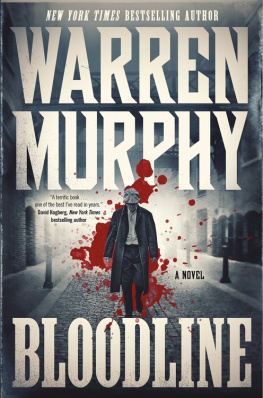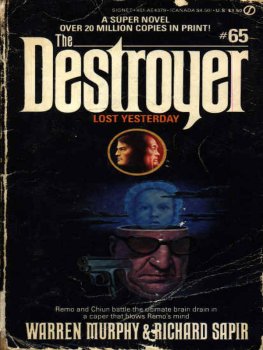Destroyer 97: Identity Crisis
By Warren Murphy and Richard Sapir
Chapter 1
Dr. Harold W Smith harbored no thoughts of suicide as he pecked his wife of forty years on the cheek, exited his Tudor-style house in Rye, New York, and climbed into his battered station wagon. Not his suicide, not anybody's. Not today, not tomorrow. Hopefully not ever.
Mrs. Smith called after him from the open door. She was a frumpy woman with blued hair and the body of a comfortable sofa chair.
"Harold, will you be working late again?"
"I believe so, dear."
"Shall I leave your meat loaf warming in the oven or in the icebox for you to reheat?"
"In the icebox, dear," said Harold Smith, starting the car.
He barely noticed the unmarked white van parked across the street and had no inkling that he was being videotaped by a hidden camera. Had he known, he might have given some thought to taking his own life-even in front of his sad-faced wife, who stood in the open door, her hand fluttering in its usual goodbye wave.
When Smith pulled out of his driveway, the van stayed put. A burgundy Ford Taurus at the end of his street slithered after him when he turned left. It followed him through the center of town, and when Smith stopped for gas, it kept going.
He paid for the gas with two crisp one-dollar bills and thirty-seven cents in exact change counted out from a red plastic change holder. The minute Smith put the gas station behind him, a delivery truck got in front of him and took the same wooded road that led to Smith's place of work. Smith thought nothing of this, either. It was a well-traveled road up to the fork in the road. Many vehicles took it.
When the delivery van reached the fork, it cut left. Smith kept to the right and had the winding wooded road all to himself, as he did virtually every morning of his six-day work week.
The road was secluded. On either side the black-and-white pillars of poplars stood in lonely ranks, their dead leaves a carpet of yellow and brown on the ground. They were as naked as the telephone poles that switched by every hundred yards or so.
Smith spotted the telephone lineman up on a pole a quarter mile before he came upon him, and was prepared for the NYNEX repair van parked on the soft shoulder of the road. Slowing, he eased past it, wondering if there was a problem with his lines. The poles served his place of work exclusively. It never occurred to him to look beyond the obvious or question the work the lineman was doing.
Smith noticed everything and yet nothing. He had been taking this identical, unvarying route for some thirty years now. There were other ways to reach the winding road to Folcroft Sanitarium, but Smith never used them. He was a man of stultifying but comfortable routine.
The same road, the same exact minute of departure and the identical time of arrival. These things never changed. Smith also wore the same gray three-piece suit to work every day. It was early autumn, so a gray porkpie hat covered the gray hair that was too thin to protect his head from the chill. Since it had been his habit to wear a hat in cold weather all of his adult life, the fact that the hat was twenty years out of fashion seemed beside the point.
When he sent the rust-eaten station wagon through the unguarded brick gate to Folcroft Sanitarium on the shores of Long Island Sound, he didn't have to look at his ancient Timex wristwatch to check the hour. He drove like a machine, and like a machine he invariably arrived at work at the exact same time.
Thirty years, and only once had Harold Smith been more than sixteen seconds late by his self-winding Timex. He took a secret pride in that record. That one exception was due to a flat tire which he had fixed himself and still managed to arrive, technically, on time. That had been on November 24, 1973. The date had remained burned into his memory. He promised himself it would never happen again. Smith had kept that promise.
Smith parked in his comfortable reserved parking spot in the east parking lot and emerged carrying a worn leather briefcase that looked like a hand-me-down.
Being an unimaginative man, he felt no eyes on him. There were boats out on the sound. He noticed them because he noticed everything, but they were ordinary speedboats. He had no inkling that from those boats, six pairs of Bushnell binoculars followed him to the main entrance.
Smith nodded to the lobby guard and took the elevator to his second-floor office, where he greeted his personal secretary with a curt "Good morning, Mrs. Mikulka." His voice sounded the way lemons taste, sour.
His secretary said, "No calls, Dr. Smith."
It was exactly 6:00 a.m. Of course there were no calls at this hour. But over the years, Harold Smith had always asked, and so Eileen Mikulka got into the habit of answering the unspoken question in lieu of a greeting.
"Is there a problem with the phone lines?" Smith asked.
"Not that I am aware."
Frowning, Smith passed on.
"Oh, Dr. Smith."
Smith paused. "Yes?"
"Dr. Gerling reported another one of those mysterious incidents last night."
"The drumming?"
"Yes."
"Which patient reported it?"
"Why, Dr. Gerling himself. He claimed that he stepped off the third-floor elevator and the drumming started up immediately. He chased it around a corner to a utility closet, but there was nothing in the closet when he opened the door. By then, the drumming had stopped."
Smith pressed his slipping glasses back into place. "Odd. Did he say anything else?"
"Yes, he thought it sounded familiar."
"Familiar how?"
"He didn't say, Dr. Smith. Dr. Gerling couldn't place it, but he was certain the drumming was something he had heard before."
Smith made a prim mouth. "When he comes on duty, ask Dr. Gerling to report to me."
"Yes, Dr. Smith."
Smith closed the door behind him and crossed the Spartan office toward the desk that faced away from the one concession to Folcroft's scenic location, a picture window framing Long Island Sound.
The speedboats were still clustered out there. Had Smith been aware that they were filled with men fighting the focusing rings of their binoculars and barking into walkie-talkies in frustration, he might have suffered a heart attack right then and there and been spared the need to take his own life. But he was oblivious and so pressed the hidden button under the edge of his desk. The window behind him was made of one-way glass. He could look out, but no one could see in.
The top of his desk was a slab of tempered black glass. The instant he pressed the concealed button, an amber computer screen sprang into life under the black plate. The buried monitor was set at an angle so only the man seated at the desk could read the tilted screen.
Smith brought his thin fingers to the desktop. Their nearness illuminated the dormant keys of a touch-sensitive keyboard. He went to work, tapping the thin white letters, which flashed with each silent stroke of his fingers.
The computer booted up soundlessly. Smith waited while the virus-check program ran and silently announced that the banks of mainframes and WORM array disk drives that toiled under lock and key in the basement of Folcroft Sanitarium were secure and virus free.
ON ONE OF THE BOATS out in the sound, a man scanned Folcroft with an electronic device designed to pick up radio transmissions from any monitor in the building and duplicate the display on a portable screen. He got white noise. There was only one monitor in all of Folcroft, and Smith's office walls were honeycombed with a copper mesh designed to soak up all radio emanations, shielding it against such sophisticated electronic eavesdropping.
Two miles down the road the man dressed as a telephone lineman was hanging from a safety harness and listening to the tap on the Folcroft phone lines, unaware that he was wasting his time. The critical telephone lines left Folcroft through an underground conduit not found on any AT t.
Next page



